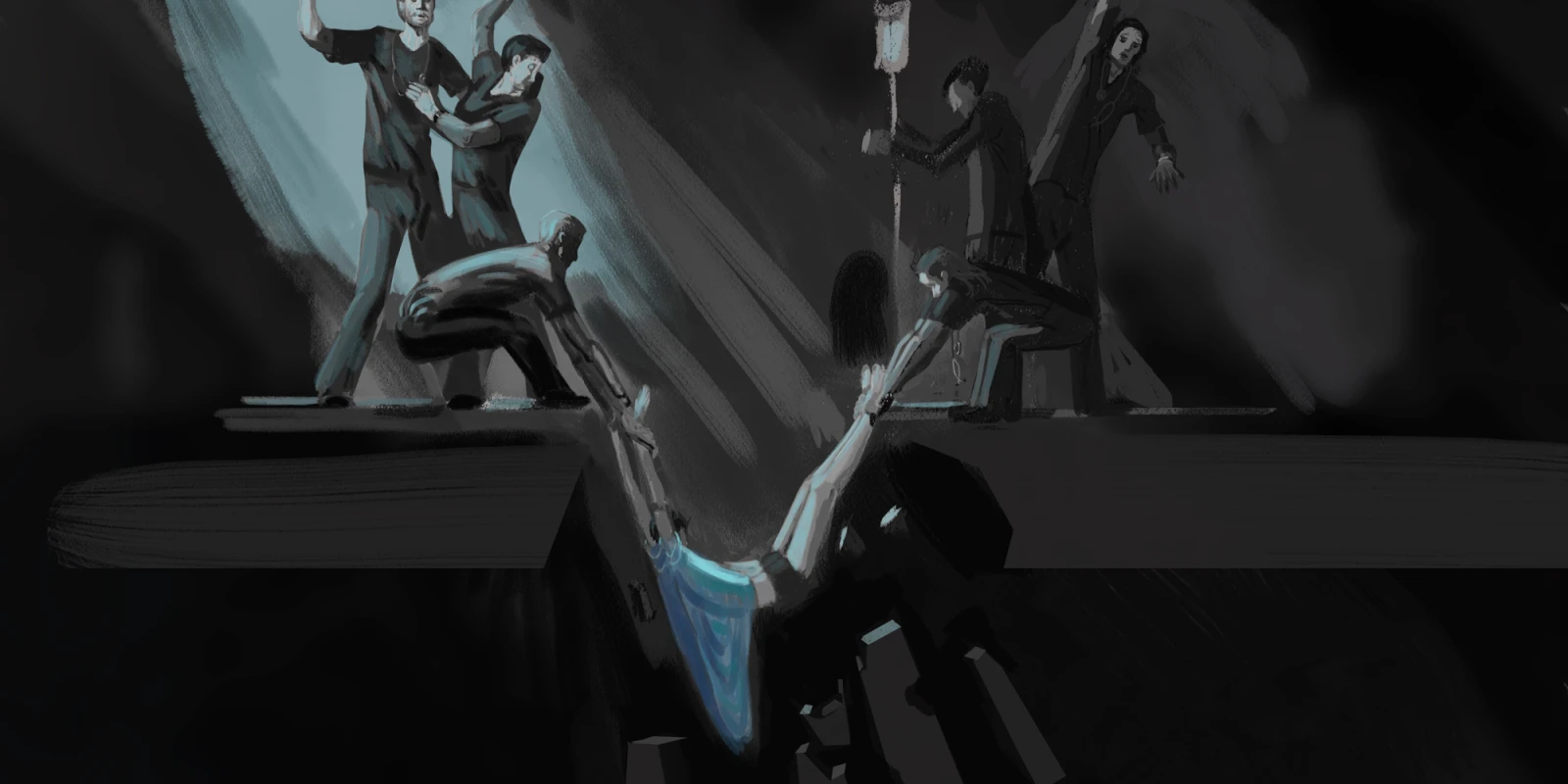 We’re here, David! David! We’re here!
We’re here, David! David! We’re here!
His eyes were looking straight at me in a dream-like trance, as if trying to hold on to reality, as if begging me not to go. I held his head, trembling. I kept telling him to rest, he would need his energy later; kept pulling his hair back, wondering how long it had been since someone had locked eyes with him, or touched his face, or held his hand. I combed his hair like one would a child, as if by making him feel safe, his soul would choose not to leave. No one would be in my place, staring down the limits of his humanity, had it not been for the Code Blue that woke us all from our own daily trance. I pulled my hands away from him for a moment and realized I had inadvertently stripped away half of his hair. He was so weak. I felt my heart burrow inside my chest, aching to help him.
I had met David before, briefly. He had been staring at me from his trauma bed, as if waiting for something. I asked if he was OK, which really meant “How can I help?” At some point the surgeons had made an opening through his throat and inserted a tube so he could breathe— now he could barely talk. I could make out “Iit..huuurts..” in the muffled vocals under his crackled breathing. I told him I’d get the nurses to give him some more pain medication. Looking at David somehow hurt me too, and so I hesitated in reaching out towards him, feeling there was not much I could do, other than up the morphine. That was it.
In the Trauma Bay, patient’s background stories can range from absolutely tragic to rage-inciting. David’s story fell in the tragic category. He was walking home from college when he was assaulted. They cut his throat and stabbed his abdomen, leaving him for dead. He survived, but had been submitted to repeated interventions since. He used to be an athlete. Now he’d lost so much weight, he was barely recognizable. Most who told his story quickly followed with: “He didn’t deserve this.”
Does anyone?
David was moved to the trauma intermediate care unit, and out of my thoughts for a while.
Code Blue, TICU, 306. Code Blue, TICU, 306. Code Blue, TICU, 306
That was David.
I rushed to his room as part of the Trauma Team, not really knowing what was going on. I was a third-year medical student, and this was the first time I was called to a Code. David’s lips were gray and there was not the slightest hint of red on his cheeks. His pulse was faint and erratic.
The multiple sensors attached to his body echoed a desperate SOS. His oxygen saturations were low. SOS. His blood pressure kept dropping. SOS. He was cold.
His heart was racing faster and faster. The EKG tracing had a mind of its own. There was blood on his sheets. SOS. SOS. SOS.
Normal saline! Someone get the normal saline!
Bring the crash cart!
We need an artery!
David, are you with us?!
I don’t remember how things happened. Five pairs of hands hovered over David. They worked together to bring him back. They pricked him and stung him in a desperate attempt to find a viable artery. We surrounded him like vultures.
All the while, I spotted his mother outside the door. She wasn’t allowed in at the time. Disheveled, she wailed at the social worker about our terrible care and lack of compassion, before she broke down to cry.
I had been giving him a carotid massage for what seemed an eternity. It had slowed down his pulse, which now beat regularly. He was oxygenating well. His vital signs were stable. I held his head and tried to wipe some of the secretions oozing down his neck, as I would have wanted someone to do for me. We could breathe again, but we were far from done. We had almost lost him. We might lose him still.
Patient’s stories come up repeatedly during patient care. They evolve as they make their way from the scene to the ER to the floor. “Teenage male patient assaulted 6 months ago, gang and drug-related. In and out of the hospital since.” The nurse proceeded to list his procedure history as she signed off to the incoming shift. I saw a glimpse of anger in the resident’s face when she heard this version of David’s story. I could tell she was disappointed and wondered if she would have acted differently had she heard it before. Yet, she kept on going, giving orders as surely as before, and I knew it wouldn’t have made a difference.
It didn’t make a difference for me either. As I looked into his eyes I saw my own fear reflected. Breathe in. Breathe out. I recognized myself. His freckled, dazed face could have belonged to anyone: a student, a teacher, a beggar, a crook. Stripped from belongings and titles, we would all only be human: flawed, fearful, frail.
David moaned in pain, and I longed to save him — to save us both.
I held his head, trembling.
We’re here, David. We’re here…
Illustration by Jennifer Bogartz
Born and raised in Puerto Rico, Nicole Yordán is currently a general surgery resident at Kendall Regional Medical Center in Miami, Florida. She graduated from the University of Puerto Rico School of Medicine in 2018 and hopes to continue writing in fiction and non-fiction throughout her career. All names and identifying information have been modified to protect patient privacy.







